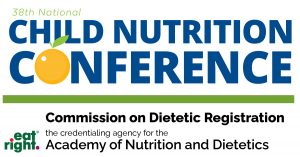Blog
Meal Pattern Minute: Meal Counts During Family Style Dining
When serving a meal family style in the CACFP, when are meal counts taken?
Read MoreUpcoming Virtual Events in May
Check out these virtual events coming up this month at NCA!
Read MoreMeal Pattern Minute: Reimbursement for Family Style Dining
Can a family style meal be reimbursed if a child does not serve themself all of the food components offered?
Read MoreEarn CPEUs at the National Child Nutrition Conference
We’re thrilled to inform you that the 2024 National Child Nutrition Conference offers an excellent opportunity for you to earn Continuing Professional Education Units (CPEUs) while immersing yourself in a world of learning and networking.
Read MoreFinal Rule: Updates to Meal Patterns in CACFP & SFSP
The USDA recently released a Final Rule that better aligns meal patterns in the CACFP, SFSP, and School Meals with the Dietary Guidelines for Americans.
Read MoreBlake Stanford Receives Lifetime Achievement Award
The National CACFP Sponsors Association (NCA) is pleased to present Blake Stanford with the Lifetime Achievement Award for his outstanding vision, dedication, and commitment to the advancement of the Child and Adult Care Food Program (CACFP) community.
Read MoreMeal Pattern Minute: Preparing Children for Family Style Dining
What can you do outside of meal service to prepare children for family style dining?
Read MoreHealthy Tots Helps Address Food Insecurity in D.C.
Across the nation, racial inequities have impacted access to federal nutrition programs for people of color. The report by D.C. Hunger Solutions aims to address how racial inequities contribute to hunger and poverty among residents of color in the District of Columbia and to lack of access to federal nutrition programs.
Read MoreThe CACFP Combat Child Hunger and Supports Working Families
According to a USDA report, one in every five children in the United States is food insecure, meaning that approximately 13 million children do not know where their next meal will come from. The CACFP provides quality meals to many of these children and helps working families protect their children against hunger. Read more about how CACFP contributes to food security.
Read MoreSponsor Spotlight: Kate Abernathy of Providers Choice
Kate Abernathy is the Chief Executive Officer (CEO) of Providers Choice which is a state-wide sponsoring organization of 3,000 family child care homes and 90 centers in Minnesota. Hear from Kate!
Read More









